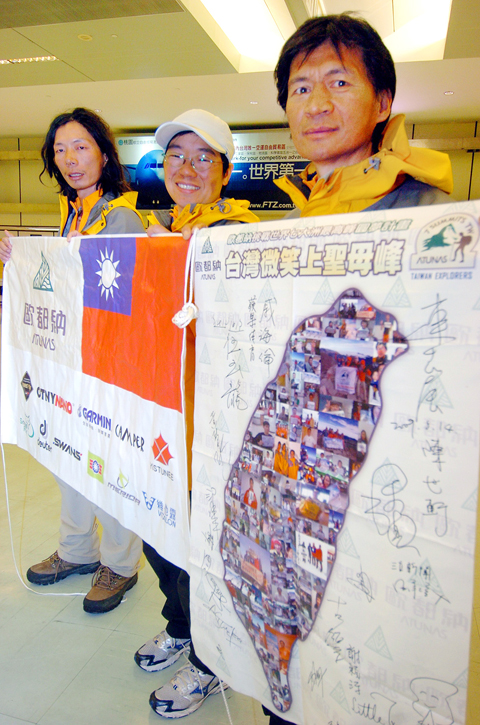Three Taiwanese climbers who scaled Mount Everest last week returned home from Bangkok yesterday, with all three ready for their next challenge.
Chiang Hsiu-chen (江秀真) and her fellow mountaineers received a hero’s welcome at Taiwan Taoyuan International Airport. Their success made Chiang the first Taiwanese woman to conquer the highest peaks on seven continents. It also marked the first time in 13 years that Taiwanese alpinists made it to the top of the 8,848m Mt Everest, said the Atunas Group, which organized the latest expedition.
Chiang, 39, has scaled the highest mountain in the world from both the north side and the south side of the peak, after completing the assault on Mt Everest’s summit last week from the south side, the more conventional route. She climbed the more treacherous north side 14 years ago.

PHOTO: CHU PEI-HSIUNG, TAIPEI TIMES
MISSION
Chiang, a mountain ranger at Yushan National Park, and the two male climbers — Wu Yu-lung (伍玉龍), a 49-year-old Bunun tribesman who is the leader of a rescue team, and 33-year-old Huang Chih-hao (黃致豪), who is doing postdoctorate research in electronic engineering at Colorado State University — reached the top of Mt Everest at 12:52pm on May 19.
In a brief interview with the Central News Agency at the airport, Chiang said she was looking forward to her next mission — developing a system to teach mountain climbing in Taiwan.
“Teaching and training [people] about mountain climbing is even more challenging than scaling Mt Everest,” she said. “I will try my best in the next 20 years to contribute to mountain-climbing in Taiwan, an island that boasts a number of high peaks.”
Wu said he would work two or three more years to save enough money to challenge the world’s third-highest peak in India.
Huang said his next challenge would be climbing one of the world’s highest mountains without the aid of bottled oxygen and Sherpa guides, and making a documentary about it.

Trips for more than 100,000 international and domestic air travelers could be disrupted as China launches a military exercise around Taiwan today, Taiwan’s Civil Aviation Administration (CAA) said yesterday. The exercise could affect nearly 900 flights scheduled to enter the Taipei Flight Information Region (FIR) during the exercise window, it added. A notice issued by the Chinese Civil Aviation Administration showed there would be seven temporary zones around the Taiwan Strait which would be used for live-fire exercises, lasting from 8am to 6pm today. All aircraft are prohibited from entering during exercise, it says. Taipei FIR has 14 international air routes and

The Ministry of National Defense (MND) today released images of the military tracking China’s People's Liberation Army (PLA) movements during the latest round of Chinese drills around Taiwan. The PLA began "Justice Mission 2025" drills today, carrying out live-fire drills, simulated strikes on land and maritime targets, and exercises to blockade the nation's main ports. The exercises are to continue tomorrow, with the PLA announcing sea and air space restrictions for five zones around Taiwan for 10 hours starting from 8:30am. The ministry today released images showing a Chinese J-16 fighter jet tracked by a F-16V Block 20 jet and the

Snow fell on Yushan (Jade Mountain, 玉山) yesterday morning as a continental cold air mass sent temperatures below freezing on Taiwan’s tallest peak, the Central Weather Administration (CWA) said. Snowflakes were seen on Yushan’s north peak from 6:28am to 6:38am, but they did not fully cover the ground and no accumulation was recorded, the CWA said. As of 7:42am, the lowest temperature recorded across Taiwan was minus-5.5°C at Yushan’s Fengkou observatory and minus-4.7°C at the Yushan observatory, CWA data showed. On Hehuanshan (合歡山) in Nantou County, a low of 1.3°C was recorded at 6:39pm, when ice pellets fell at Songsyue Lodge (松雪樓), a

City buses in Taipei and New Taipei City, as well as the Taipei MRT, would on Saturday begin accepting QR code payments from five electronic payment providers, the Taipei Department of Transportation said yesterday. The new option would allow passengers to use the “transportation QR code” feature from EasyWallet, iPass Money, iCash Pay, Jkopay or PXPay Plus. Passengers should open their preferred electronic payment app, select the “transportation code” — not the regular payment code — unlock it, and scan the code at ticket readers or gates, General Planning Division Director-General Liu Kuo-chu (劉國著) said. People should move through the